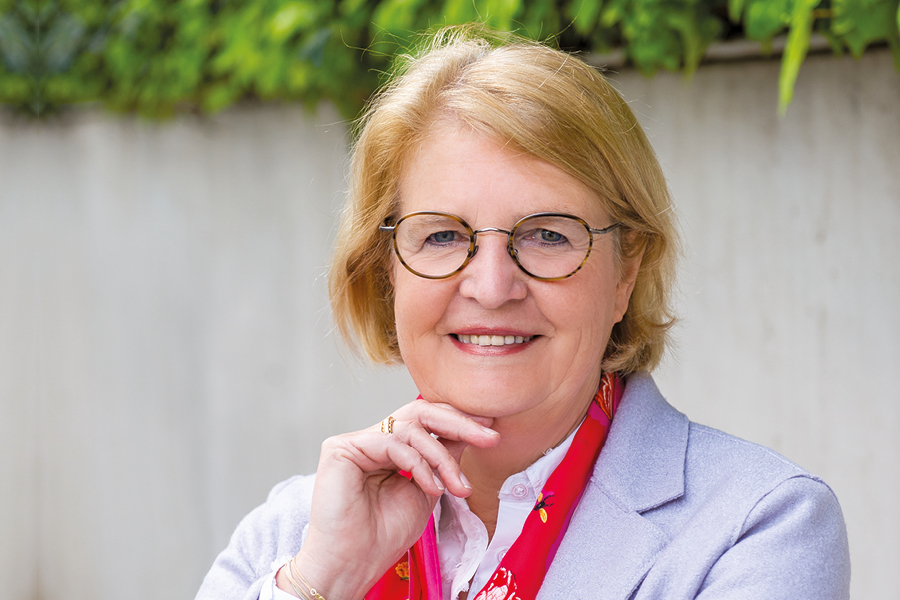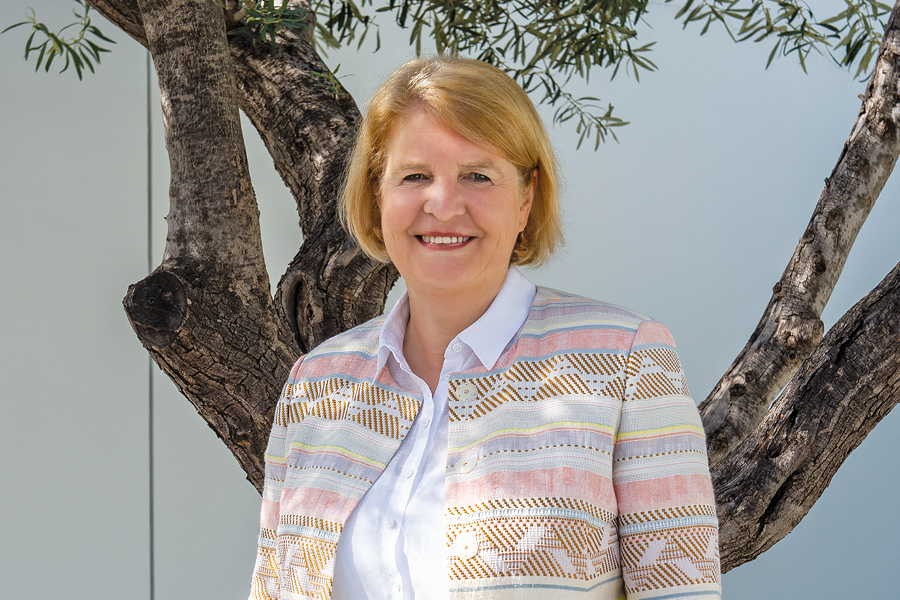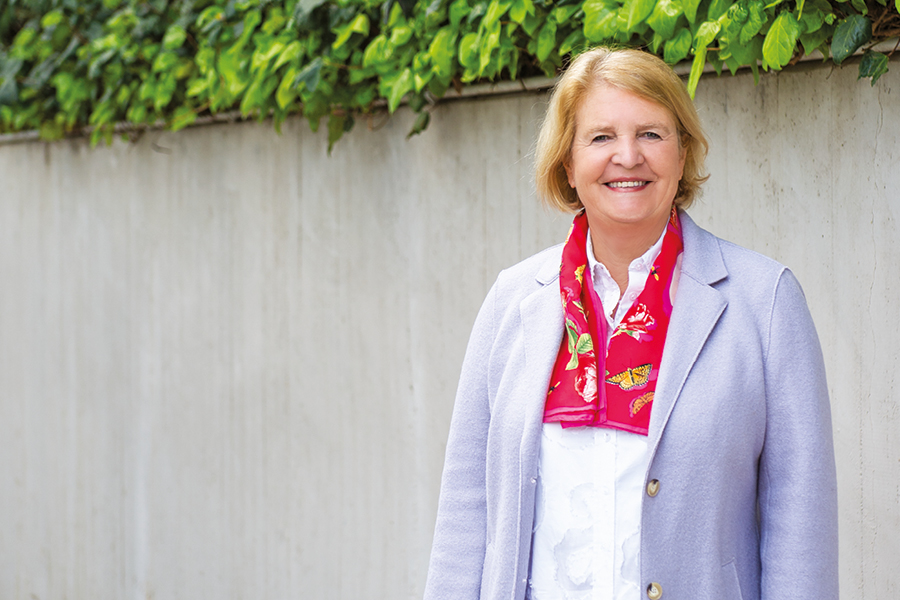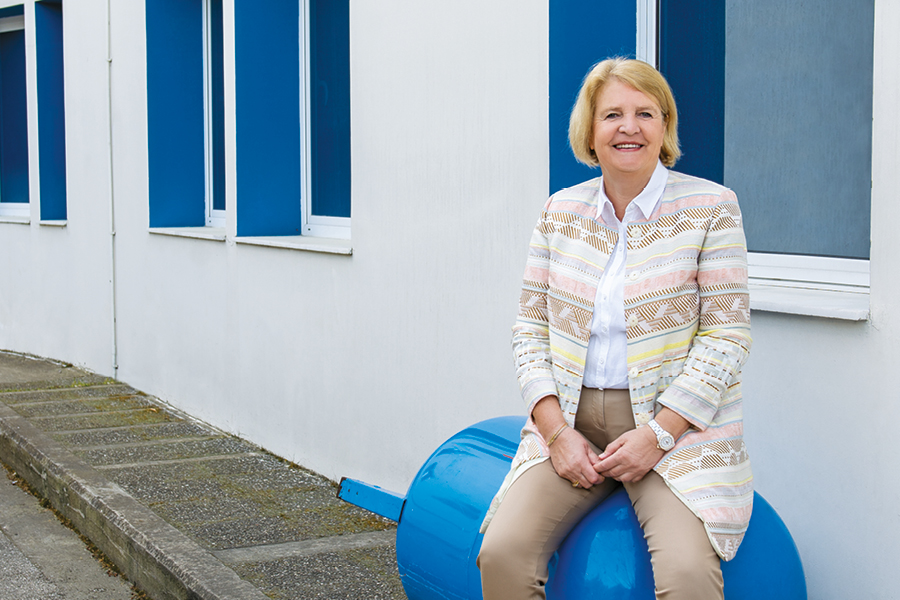Susanne Kohout: Our mission is to help people live longer and better
- 22/04/2021, 12:58
- SHARE

Interview by Anastasia Paretzoglou
Photos: Nikos Maliakos
She took over as head of Novartis Hellas in 2017, in a period of intense challenges for our country and her company. With clear positions on everything, the German-born President and CEO of the powerful pharmaceutical company favours innovative partnerships for the creation of a sustainable future and equal opportunities regardless of gender, and points out that inclusive societies must be the focus now and after the end of the health crisis caused by the pandemic.
With a degree in business administration from the University of Cologne, Susanne Kohout, a Novartis executive since 1996, is the woman who led the process of the merger of Ciba and Sandoz Self-Medication with Novartis’ Consumer Health arm. Since then, she has held several positions of responsibility in the leading pharmaceutical firm. She refers proudly to the achievements of the company that she represents and its strong position in the global market, and in the conversation that follows she explains the need for all stakeholders – organizations, companies, governments and societies – to redefine their approach to healthcare.
Mrs Kohout, one year into the pandemic, what is the one thing that concerns you the most?
The whole world was taken by storm from the pandemic and -apart from the human toll- one of the side effects observed is people neglecting other serious health conditions. Experience from the first lockdown showed significant delays in the treatment of chronic illnesses. Surgeries were postponed, patients were afraid to visit their doctors, and this could have social and economic repercussions. Prevention, early diagnosis, and proper treatment of all other illnesses should continue to be our priority. In order to avoid a major public health crisis in the coming years, a broader approach to the situation is needed, as the COVID-19 pandemic is only one of the many crises we are facing. We aren’t merely facing a once-in-a-century pandemic. We’re facing a syndemic: the confluence of several epidemics. To address these unmet needs and meet the syndemic head on, we need to reimagine our approach to health care.
What are your top priorities and your greatest challenge, as Country President and Managing Director of Novartis Hellas?
The impact of the global COVID-19 pandemic has demonstrated that fulfilling our mission as Novartis, to help people live longer and better lives, is more necessary and relevant than ever. Looking towards the future, we realize more and more clearly that each of our contributions is part of a broader movement of solidarity and cooperation, since the new challenges faced by humanity, countries and health systems are far too big and complex to be solved by individual groups, organizations or governments. Working together is essential to create a sustainable future and Novartis is here to provide solutions in this direction. Furthermore, our people are our most valuable resource. We want everyone to feel able to be their best selves at work and at home, and we are committed to supporting and enabling them to be inspired, curious and unbossed. The global pandemic has accelerated our organizational need to explore new working and training models. We focused on the protection of our employees’ health, the safety of healthcare professionals and the seamless delivery of our treatments to Greek patients. To further support the development our people, we provide access to top training providers, but we also expanded the free access to Coursera and Khan Academy digital education platforms to our employees’ families.
How do you evaluate the handling of the pandemic in Greece, compared to other European countries?
When facing an unprecedented crisis, such as the one we continue to face today, we are on a constant journey of experimenting & learning, therefore a masterplan is never enough. It is certain that many decisions are going to be questioned, or possibly, wrong, others are going to be valid or fruitful and set a foundation for corrective action. The Covid-19 pandemic has demonstrated that health is the crucial factor for the happiness and prosperity of our societies. In an undisputable manner, it revealed the many interdependencies among society, health, economy, business, politics, and science. It made evident that the health challenges we are facing today are far too big and complex to solve by individual groups, organizations, or governments, and cooperation is key. I recently had my vaccination in Athens and I was really impressed by the operational excellence of the Greek state in this matter.
You have been serving Novartis in key positions since 1996. During these years, the company discovered and placed on the market medicines and therapies that changed the course of many serious diseases. When did you feel that the company literally “made history”?
On March 7, 1996, the Swiss pharmaceutical companies Ciba-Geigy and Sandoz announced what was at the time the biggest merger in the history of the industry. Novartis was born with the vision of accelerating innovation and asserting an even stronger position on the global markets. Together with our predecessor companies, the collective heritage roots back more than 250 years, with a rich history of developing innovative products. Over the past 25 years, Novartis has achieved medical breakthroughs in blood cancer care, heart disease, multiple sclerosis and the fight against inflammatory conditions with therapies that are changing the course of medical history as they are seriously benefiting the lives of thousands of patients all over the world. Looking at the next 25 years and beyond, Novartis will continue reimagining medicine to improve and extend people’s lives. Cell and gene therapies that only need to be administered once for patients with serious, rare and life-threatening diseases are creating a new turning point in medicine and how we treat diseases. The development of cell and gene therapies has been pivotal for innovation in the field and presents the opportunity to reexamine how our healthcare system manages diagnosis, treatment, care and associated costs for patients.
You live in Greece since 2017, when you took over the position of Country President & Managing Director of Novartis Hellas. What are the things that have been intriguing and difficult for you during these three years in our country?
I joined the company at a challenging time, both locally & globally. As a person, I always choose to see challenges as opportunities for learning and further growth. Since then, we remain committed to the Greek market and we are on a journey to supply patients with life-saving therapies twice as fast, provide innovative solutions for our customers and the Healthcare system. I am confident and proud that our efforts are being recognized; the 2020 Fortune Greece Most Admired Companies award as No1 Pharma company in the country reflects just that.
Trust and reliability are at the top of society’s concerns when choosing products and services, especially when these are related to health. What makes a pharmaceutical company credible and how is trust built in times of uncertainty and financial crisis?
A big part of gaining this trust is being transparent. For many years, transparent reporting has been a central part of our commitment, as we publish locally an annual ‘Novartis in Society’ ESG (Environmental, Social & Governance) report. Most recently, we have published the results of our Corporate Responsibility Report for 2018-2019, fully in line with the principles of the Global Compact and the Goals for Sustainable Development of the UN. More specifically, Novartis Hellas returned 53% of its revenues to the Greek society and economy in 2018-2019, through investments in R&D, social programs and our supply chain. We have a strong footprint in the access to medicines, providing 54 of our treatments to 1.7 million patients, and conducting more than 70 clinical trials to approximately 2500 patients with a zero cost for the Greek healthcare system.
Can uninsured patients or patients without financial capacity have access to your medicines and innovative therapies?
Improving access to medicines remains one of the greatest healthcare needs worldwide. According to the World Health Organization (WHO), one-quarter of the world’s population – 2 billion people – have no access to basic medicines. Roughly, 1 billion people faced catastrophic payments for healthcare in 2020, driven in large part by out-of-pocket spending on medicines.
Collectively, the global health community has a responsibility to help ensure that no one is left behind and that anyone who requires treatment receives it. We established the Novartis access principles in 2017 to systematically integrate access strategies into how we research, develop and deliver our new medicines globally. This is a key measure of success for our leaders and associates. Our emerging markets center of excellence in our Pharmaceuticals business unit supports the implementation of the principles by ingraining access into all new launches in LMICs. Strategies can include establishing innovative pricing and access models, driving early launches in these countries, and supporting approaches to strengthen healthcare systems. In Greece, pharmaceutical care of uninsured citizens is covered by the state. We fully support the leverage of appropriate funding by using social welfare accounts as it has been fulfilled in the recent past.
Novartis is ranked amongst the companies most heavily investing in R&D globally and this has been your strategic priority. How many years can research for a product last and in what aspects is the contribution of new technologies most critical?
It can take years to produce breakthrough medicines. However, new technologies can help us speed up the process. Researchers are still uncovering the many ways the various techniques can be used to enhance and speed up drug discovery. The Novartis Institutes for BioMedical Research (NIBR) is the innovation engine of Novartis. We collaborate across scientific and organizational boundaries, with a focus on powerful new technologies that have the potential to help produce therapeutic breakthroughs for patients. Research teams are actively pursuing disruptive technology, scouring academic labs for new inventions and launching collaborations to push the development of equipment in a direction that will benefit scientists working in drug discovery.
For example, Novartis has an extensive experience & pipeline in neurodegenerative diseases. A great example of collaboration with academia is EuroNeurotrophin, which is a European training network for the development of neurotrophin small molecule mimetics as candidate therapeutic agents for neurodegeneration and neuroinflammation. Novartis Hellas came into agreement with the Consortium and the Marie-Curie European Training Network EuroNeurotrophin, funded by the Horizon 2020, becoming a Board Member of this innovative project. EuroNeurotrophin will enable the non-academic partners to increase their innovation capacity by (a) having access to the generated new knowledge and relevant technologies (b) giving them a “pre-emption” right to patent specific findings and (c) recruit strong post graduates or post docs (early stage researchers) into the business acting as a long term ‘feeder’ programme for junior medical roles.
Which scientific innovation is the next big bet?
One of the challenges for any healthcare system is being able to deliver the best standard of care in a cost effective way that meets broad societal needs. The future design of a sustainable and patient centric healthcare system can only be secured based on evidence-based dialogue between all health care stakeholders and this includes providers, payers, policy makers, and health care industry.
A great example is the extensive partnership of Novartis with the National Health Service in England (NHS), focused on tackling the burden of cardiovascular disease; one of the leading causes of disability and deaths in the UK. We are encouraged by the expressed will on behalf of the MoH to facilitate and integrate such initiatives in the Greek Healthcare system, to discuss and explore the possible ways that we could contribute towards that by transferring respective knowledge. We have started the dialogue towards this direction and we are open to engage in any possible collaboration with all interested parties.
This aligns with the Novartis commitment to incorporating innovative access strategies in all our new launches. Novartis is committed to generating leading scientific evidence, ensuring continuous improvement in manufacturing efficiency and optimization is part of that commitment. Apart from innovative access strategies, research and development is they key driver: AAV-based therapies, CAR-T cell therapies and CRISPR-based technologies serve our goal to reimagine medicine, produce breakthroughs and address major unmet needs for patients with devastating diseases.
The pandemic highlighted women as the backbone of recovery communities. We saw that in front-line healthcare personnel that comprises mainly women, in supermarkets, in work-from-home mothers, in nursing homes. Do you believe that putting women at the center of economies will place the world back on a footing to achieve the Sustainable Development Goals? And how is it achieved?
I am certain that putting women at the center of economies will fundamentally drive better and more sustainable development for all, support rapid recovery, and place the world back on a footing to achieve the Sustainable Development Goals (SDGs). The empowerment of women is vital for better leadership on a global scale. Various organizations are working in this direction, for example by creating easier access to capital for women entrepreneurs, but a new and broader mindset is also necessary. Activating a global network of socially oriented investors and highlighting global female role models, will contribute to increasing women’s economic empowerment. At the same time, the likelihood of achieving all SDGs will rise too. Through cross-sector partnerships, innovative financial instruments, and a renewed commitment to inclusive growth and women’s empowerment, we can rebuild the foundations for sustainability that will outlast the pandemic era.
Women are disproportionately affected by the Covid-19 crisis, however. According to a recent McKinsey survey, whereas women comprise 39% of the global workforce, 54% of the total jobs lost during the pandemic were jobs that were occupied by women. How can companies lessen Covid-19’s impact on women and how do you face it at Novartis?
It is true women, alongside the poor, elderly, disabled and migrant populations, have borne the brunt of the fallout from the pandemic as they are more likely to be working in a sector that shut down. And when they could continue working, mothers were more likely to stop work than fathers. Teleworking has added an additional burden on women, such as childcare and caring for the elderly or vulnerable family members. At Novartis, to help our people cope with the demanding situation, we launched globally the “choice with responsibility” initiative, giving the flexibility to our associates to work from the safety of their house as long as they wish. We also equipped all corporate mobile phones and iPads with a special app, which provides advice on exercise and nutrition, and psychological support, as well as 50 free coaching sessions. Employees can engage in online discussions about stress management, children and adolescents support, relationship management, helping vulnerable groups, etc. We are confident these tools are an additional help for multitasking women during the pandemic.
Why is it that in Greece, we are so behind in matters of women representation – both in business and in politics as well as elsewhere? Do you think that leadership, decision-making and taking up responsibility is in contrast with the “female nature” or role, and why is that?
On the contrary, women thrive equally as their men counterparts on leadership when they are given equal opportunities. In fact, underlining the company’s continuous commitment to diversity and inclusion, at Novartis Hellas currently the percentage of women working in high-responsibility roles is 60% and women representation in the Country Leadership Team is 50%. Generally, though, the problem is that have few opportunities for a number of reasons. Social constructions and cultural stereotypes are keeping women behind. The most common example relates to the dilemma between motherhood and professional development. When women feel they need to choose between being a mother or advancing professionally, that automatically means inequality exists. This is a deep-rooted problem that, in each country, should be dealt with at multiple levels: by state regulators, by employers’ practices and by shifting towards a new societal mindset. Together, we can break stereotypes. At Novartis, we celebrate life and recognize moments that matter. From January 2021, all our people around the world can benefit from a minimum period of 14 weeks paid parental leave following the birth, or adoption of a child, effective from their first day of employment. By offering the same parental leave to all parents, regardless of gender or sexual orientation, we seek to promote greater equity for birthing and non-birthing parents and give everyone the flexibility and opportunity to make the choices appropriate for their families.
Life now is more uncertain than ever. It’s hard to know what to worry about first. What worries you the most?
COVID-19 may prove to be the biggest challenge of our lifetimes. While putting at risk the livelihoods of millions of people around the world, the pandemic has slowed progress against poverty and diseases and has hindered efforts to protect the environment and to provide education especially in developing countries. We should not allow rising inequalities to threaten stability, progress, and growth and to undermine our joint efforts to address our shared challenges. More inclusive societies must be the focal point now and beyond the end of this healthcare crisis. After addressing this acute situation, we must gather important learnings, emerge stronger, prepare for and shape the ‘New Normal’.



